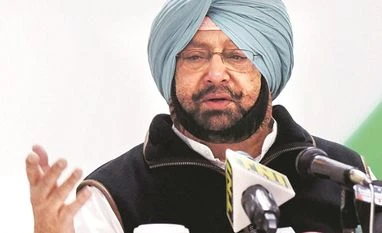On a day of swift-moving developments, around 30 minutes before former Punjab chief minister (CM) Amarinder Singh was to meet Home Minister Amit Shah, Navjot Singh Sidhu resigned from his position as state chief of the Congress, a job he got in July.
In his letter to Congress President Sonia Gandhi, Sidhu, the man responsible for having Amarinder Singh ousted, said his actions stemmed from ‘the compromise corner’, suggesting the new Punjab CM Charanjit Singh Channi might have been too independent-minded for Sidhu’s liking.
“The collapse of a man’s character stems from the compromise corner. I can never compromise on Punjab’s future and the agenda for the welfare of Punjab,” he wrote in the letter, adding, “Therefore, I hereby resign as the president of the Punjab Pradesh Congress Committee. Will continue to serve the Congress.”
At the meeting with the home minister, some discussion on a U-turn by the BJP government on farm laws was to have been held, sources close to Amarinder Singh said. It is well known that it was the former CM’s efforts that led to an amended version of farm laws being passed by the Punjab Assembly that even the Akali Dal was forced to endorse.
“What Captain saab was seeking was honour. The BJP understood this and would have given the credit for a compromise on farm laws to him,” these sources said.
The jury is still out on whether Sidhu’s resignation alone will be enough to dissuade Amarinder Singh from crossing over into the BJP in the future. A cost-benefit analysis done by the BJP indicates there is no down-side for the party if Amarinder Singh joins it: he will become the much-needed Jat Sikh face the party needs, and his acceptability as a pan-Punjab leader will deepen the BJP’s reach in the state, ending forever its dependence upon the Shiromani Akali Dal.
A compromise on farm laws is a small price to pay for this. Amarinder Singh said he would hold discussion with his supporters on further moves over the next few days. But this much is clear: the Congress leadership has been shown up in extremely bad light for its bumbling and transactional approach to managing Punjab politics.
Channi’s recent moves make it clear he was reluctant to let Sidhu become the éminence grise. Aruna Chaudhary, who is the CM’s relative and faces anti-incumbency in her constituency Dinanagar, was made a minister. Sidhu had been pitching for a berth to the Congress’s state Scheduled Caste department head Raj Kumar Chabbewal. Rana Gurjeet Singh was made minister by Channi, even though there were corruption charges against him. Sukhjinder Randhawa’s name for CM was scuppered when Sidhu felt a fellow Jat Sikh might overshadow him. But Randhawa was given the home department, a position almost as important as that of the CM. Many other suggestions on the way the government should function were ignored by central Congress and Sidhu was gently asked to focus on running the party instead of meddling with the government.
)
)

















